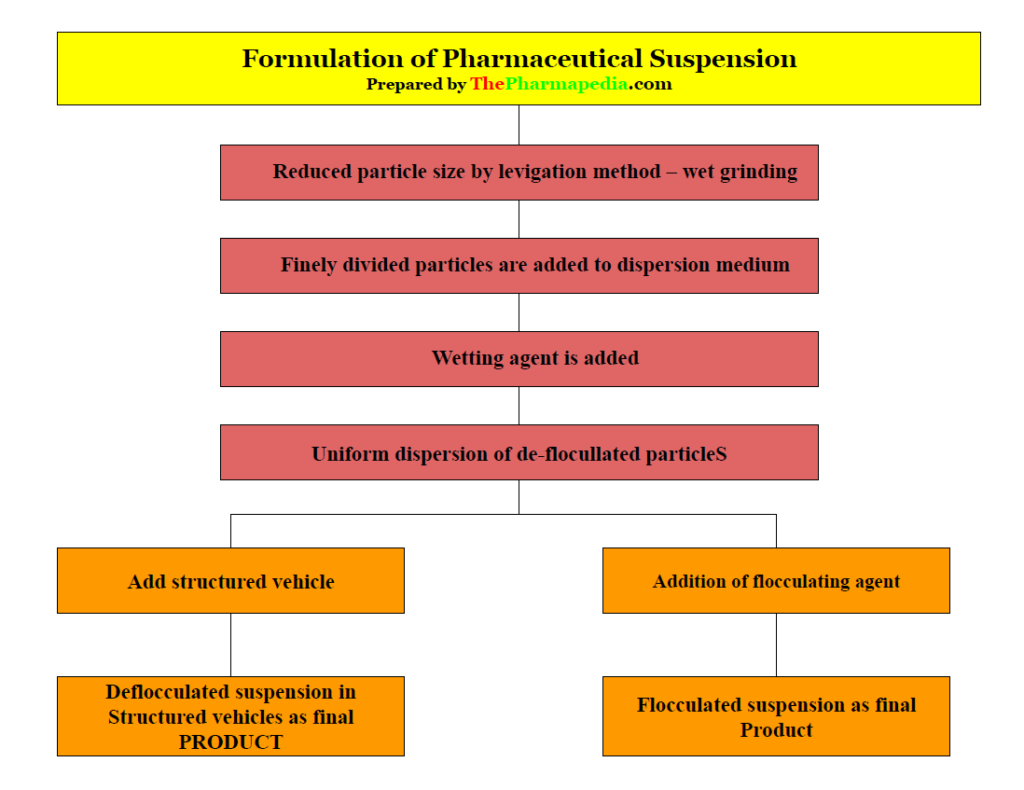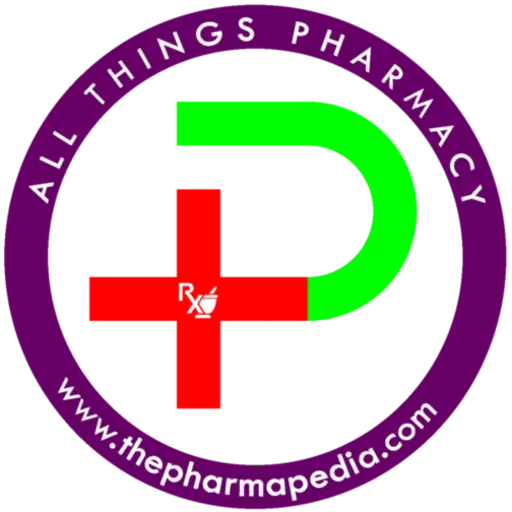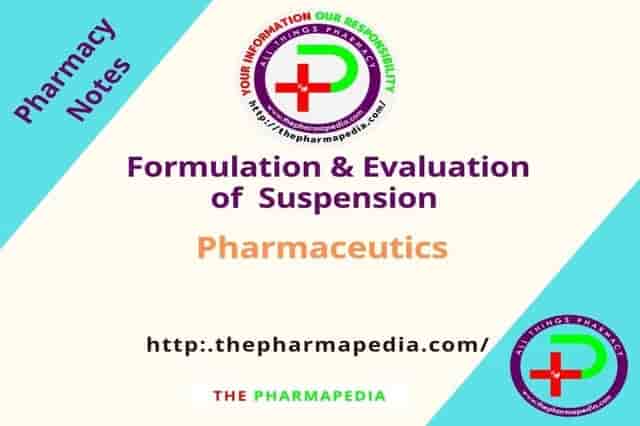Manufacturing of suspension
The formulation of a suspension depends on whether the suspension is flocculated or deflocculated. Three approaches are commonly involved.
- Use of structured vehicle
- Use of controlled flocculation
- Combination of both of the methods

Structured vehicle
- Structured vehicles called also thickening or suspending agents.
- They are aqueous solutions of natural and synthetic gums.
- It is applicable only to deflocculated suspensions.
- E.g. methylcellulose, sodium carboxy methylcellulose, acacia, gelatin and tragacanth. These are used to increase the viscosity of the suspnsion.
- These structured vehicles entrapped the particle and reduces the sedimentation of particles.
- Thus, the use of deflocculated particles in a structure vehicle may form solid hard cake upon long storage.
- Too high viscosity is not desirable as:
- a) It causes difficulty in pouring and administration.
- b) It may affect drug absorption since they adsorb on the surface of particle and suppress the dissolution rate.
- Structured vehicle is not useful for Parenteral suspension because they may create problem in syringeability due to high viscosity.
Controlled flocculation
Controlled flocculation of particles is obtained by adding flocculating agents, which are:
(1) electrolytes
(2) surfactants
(3) polymers
Flocculation in structured vehicles
Sometimes suspending agents can be added to the flocculated suspension to retard sedimentation
Examples of these agents are:Carboxymethylcellulose (CMC), Carbopol, Veegum, and bentonite
Ingredients for formulation of suspensions
| 1. | API | Therapeutic active substance |
| 2. | Wetting agents HLB= 7-9 | Added to disperse solids in the continuous phase. Decrease interfacial tension between solid particles and liquid mediums. E.g. Alcohol in tragacanth mucilage, Glycerin in sodium alginate. |
| 3. | Flocculating agents (Surfactant & Polymer) | To floc the drug particles; They lead to a decrease in repulsion potential and make particles come together to form loosely arranged floccules. Act by reducing the surface tension. E.g. SLS, Tweens, Span, Carbowax. |
| 4. | Thickened & Suspending agents | Impart viscosity of the suspension a. Polysaccharide=> Natural- Acacia, Starch, Talc ; Synthetic- MC, b. HPMC b. Inorganic agents=> Clay, AI(OH)3 c. Synthetic => Carbomer, Collodial SiO2 |
| 5. | Buffer/ pH adjusting | To stabilize the suspension at the desired pH range |
| 6. | Osmotic agent | To adjust osmotic pressure (Specially Parenteral preparation) |
| 7. | Organoleptic additive | To impart desire color to improve elegance Coloring agent, sweetening agent, Flavoring agents |
| 8. | Preservative | To prevent Microorganism growth Benzoic acid, Methylparaben, Benzoic acid, Sodium benzoate |
| 9. | Protective Colloids | They are absorbed on insoluble particles and increase the strength of the hydration layer formed around suspended particles through hydrogen bonding and molecular interaction. E.g- Gelatin, natural gum and cellulosic derivatives. |
Wetting agents
- Hydrophilic materials are easily wetted by water while hydrophobic materials are not.
- However hydrophobic materials are easily wetted by non-polar liquids.
- The extent of wetting by water is dependent on the hydrophillicity of the materials.
- If the material is more hydrophilic- less difficulty in wetting by water.
- The concentration used is less than 0.5 %.
Suspending Agents:
- Suspending agent are also known as hydrophilic colloids which form colloidal dispersion with Water and increase the
viscosity of the continous phase.
Suspending agent form film around particle and decrease interparticle attraction. - Most suspending agents perform two functions (i.e. besides acting as a suspending agent, they also imparts viscosity to the solution).

Read more…
Evaluation of Pharmaceutical Suspension
Join Our WhatsApp Group to receive the latest updates like Pharma Job notifications, study materials, admission alerts, Pharma News, etc
Join Our Telegram Group to receive the latest updates like Pharma Job notifications, study materials, admission alerts, Pharma News, etc
Join Our Telegram Group to Download Free Books & Notes, Previous papers for D.Pharm, B.Pharm, M.Pharm, Drug Inspector & GPAT……….










